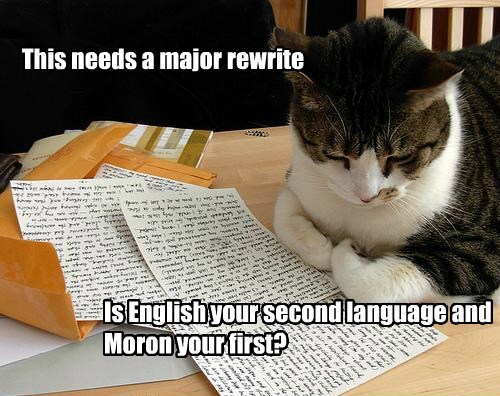1/21/2019
So you just finished that manuscript you’ve been working on, and it’s anywhere between 80,000 and 130,000 words. Editing such a large body of written work is quite a task, which is why you need to hire an editor.
Except, in reality, a good editor is very expensive, and a lot of small-time writers can’t afford to pay $600-3000 for a professional editor. (These are averages based on editors with credentials who accept work between 80-130k words.) There are those willing to work for less, but you risk getting what you pay for.
For most poor starving writers, dishing out that kind of cash for professional help is just not within their means, and many of us find that we have to go it alone. If you are one such writer, who has to be a do-it-yourselfer when it comes to editing, there are many ways for you to be a better and more thorough self-editor.
So sit back and let the J share her guide to self-editing!

Disclaimer: Please note that self-editing is NEVER going to be as effective or professional as hiring an expert. You need others’ eyes and other opinions, and if you can scrape up the money to hire an editor, please, please do!
But, for those out there who really truly can’t afford it, and would rather self-edit than throw their manuscript in the trash or lock it away somewhere, never to see the light of day, then this guide will help you.
First, something to know about the publishing process: if you’re planning on getting your work published through a traditional publishing house or a small/indie publisher, or even going through an agent, they will expect your work to be thoroughly edited “before” you submit it for consideration. Publishing houses will have editors, but most don’t do full edits. They’ll mostly comb your work to correct any really glaring mistakes and make suggestions to improve marketability. They’ll look to see if it’s already been edited, and if not, you’re likely to get a rejection. Many people make the mistake of thinking they don’t have to hire an editor because if an agent or publisher accepts their manuscript, they’ll do all the work. No, they won’t. Your manuscript must be FULLY edited before you hand it off to agents or publishers. It’s a common misconception that once they accept your manuscript, they’ll do all the work for you. They won’t. I’m sorry, it doesn’t work that way.

Be sure to:
+Find beta readers (good ones and as many as you can get). Ask them to comb for plot holes/inconsistencies, weak characterization, overall plot, story pacing, and of course, grammar/spelling/typos, etc. Take all feedback, no matter how harsh, constructively. If you think a beta reader is rough, trust me, a professional editor is even rougher.
+If you can, invest in grammar/editing software. I recommend Grammarly Pro, but also you need at least two softwares (for the love of god, don’t depend on Word spellchecker). My other recommendation is AutoCrit, which is more fiction/prose focused and is one of the better softwares at picking up issues with tense.
+Make an editing guide. Mine has a very long list of words that I mix up, and it reminds me to go back and check my work for commonly repeated mistakes. I have to keep a very close eye on homonyms, homophones, and homographs.
+Remove as much passive voice as you can. Some software can help with this.
+Make sure your narrative voice is consistent. Whether you’re 3rd person omniscient, 1st person past tense, 1st person present tense, close 3rd person omniscient, make sure your narrative voice is consistent throughout the entire manuscript. Shifting narrative voice without some sort of transition can be jarring for readers.
+Replace weak adjectives. (Very is very weak!)
+Make sure proper nouns are capitalized.
+Remove unnecessary semicolons. If you can, break it into two sentences. Do it.
+Break-up/Shorten run-on sentences.
+It’s okay to use contractions in fiction, especially in dialog. And it lowers your word-count!
+Remove ellipses! Unless they’re used in the dialog to indicate a pause, or a character gathering their thoughts, or non-dialog that is implied to be a part of the character’s thought process, they are unnecessary. (…)
+Remove unnecessary filter words. Depending on your writing style, you might lean on some filter words more than others. Beware words like: had, began/begin, feel/felt, see, look, hear, know/knew, realize, wonder, decide, notice, remember, think, that, really, very, then, start, sudden, just, almost, rather, somewhat, clearly, great, certain, she/he/I, and was. You don’t have to remove every instance of these words! By all means, please don’t! But, do be sparing with them.
+Do line editing. Go through every line one by one to look for mistakes. You can even do this backward, starting at the end of the story and editing lines until the beginning; that way, you see what you’ve written with fresher eyes.
+Tighten up your sentences by removing superfluous words. Instead of, “He fell down, then got up and ran very fast while feeling happy.” Try, “He fell, then rose and sprinted in joy.” Same sentence. Same meaning. Fewer words and greater impact per word.
+Re-read your entire work until you are absolutely sick of it (20x, 50x, etc.). But not just in your word processor. Read it with different colored backgrounds, different fonts, print it and read it on paper, or use voice software to read it aloud for you. Read it backward. Take breaks between reading. Otherwise, you start to memorize your work, making it harder for you to recognize mistakes. You’d be amazed how taking a break and then re-reading your work on different mediums can make you notice mistakes that your eyes would just gloss over by habit.
+And finally, trust your gut. If in all your re-reads, there’s one stand-out sentence or paragraph that bugs you, perhaps you stumble over it every time you try reading it, but you don’t know why? Rewrite that shit. If it’s bugging you, it will bug your readers. Just because it’s grammatically correct doesn’t mean it isn’t clunky. If something is disrupting the flow, it needs to be fixed.
